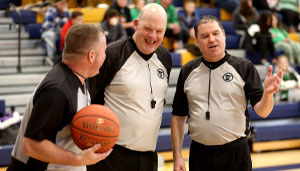It has helped our process in a multiple high school district with over 500 of coaches to let our coaches think for themselves about their “why.” Point blank, we ask coaches, “Why are you here?” We then try to create personal ownership and invest that into their role and job description. The buy in may be different at the junior level from the high school level, but nevertheless, the point is that those people who are truly interested in being leaders will take it seriously. As the old saying indicates, “The cream always rises to the top.”
Why Are You Here?
This may be the most important question you must answer as a professional, as well as personally. If you are reading this from the lens of an educator, specifically a coach, there is a very important reason why you are here.
If you go back and connect the dots in your life, there is a very strong possibility you had a teacher or coach who had an impact on you and played an important role in why you are a coach today. This may be the greatest thing about the coaching profession; it’s all about paying it forward. There is not a greater responsibility as a leader than taking those values instilled in you by those who had an impact on you, and paying it forward to those you are responsible for leading. Whether you are a middle school coach, high school coach or college coach, your ability to lead successfully is equally important.
How you grow as a leader has a lot to do with your foundation. It is paramount to being an aspiring leader that you can identify the principles that you stand for as a coach, which is better known as your “non-negotiable” components in life. A coach who has committed to the role and become successful by influencing others to be their very best has a good starting place. A leader in the athletic department must be able to comprehend the massive amounts of time and energy required to prepare athletes for winning games. There are some coaches that need not apply. Which one are you? Those that don’t understand the true devotion and sacrifice to a long-term goal to produce a winning season or a championship berth should pay close attention to improving their personal commitment and foundation.
“Leaders are developed naturally within coaching staffs when coaches coach their own coaches.” said Dr. Susan Elza, Director of Athletics for the Texas UIL. “The organizational skills that emerge when you are directing others to accomplish your winning season will ultimately become the threads that you lean on to be a more effective and powerful leader.”
Dr. Elza spends a large amount of her time speaking with coaches and she regularly reminds them that, “To gain a larger sphere of influence and in order to develop leaders to lead good programs, the best example comes from coaches that coach staff as well as their athletes.”
This is why it is so important to answer for yourself why you are doing what you are doing for a living and what is your purpose. A coach changes lives for a living. Simply stated, to become an effective leader, you must have a game plan and a method in which to execute and produce results.
Going Beyond The Game As A Leader
We all got into coaching to coach young people and have an impact on their lives. We all aspire to get “the most” out of our athletes by motivating them to put forth their best effort on the field or court, in the classroom, and the development of their character. The secret to going beyond the game as a leader in the coaching ranks stems from the very same intentions you have for your athletes. You must model them yourself and be an example to your fellow educators and coaches. You do not need to be a head coach or a campus coordinator to be a leader because leading others can occur at any level within any sport. To a certain degree, we tend to drop the ball when it comes to modeling our expectations along with really spending time with fellow coaches in discussions about our purpose and what that truly looks like. When coaching staffs are intentional about growth and development, and they take the time to have these types of conversations, this provides the greatest potential for growth in future leaders.
Three Very Important Words
For all of us to grow as leaders, there are three very important words that need to be kept in mind to reach our potential:
- Actions. Have your private and public life in balance. In regards to self-control, let your actions speak for you.
- Attitude. Have a good reputation by exercising moderation and humility. Have an attitude of resiliency – you get knocked down, get back up.
- Love. This is really our Actions and Attitude combined. The Golden Rule: Treat others as you would like to be treated. This kind of love makes us passionate for why we are here. It also holds us accountable to making great things happen.
Identifying a pathway for a coach who is aspiring to become a leader is sometimes difficult to put into common words. It’s not easy because there is no specific checklist for you as an individual. You may search for professional development outside your daily job, but most successful school programs have an ingredient that is instrumental to your daily development. Rusty Dowling, executive director for the Texas High School Athletic Directors Association, worked as an athletic director for many years and stated that, “One of the main components of leadership that I tried to focus on is creating a vision of success, then establishing a pathway that would effectively utilize the talents and abilities of those individuals on a campus that were looking for opportunities to engage in leadership, or similar environment. The vision for creating leadership was usually driven by the culture of success that we inherited or were trying to develop.”
Those in leadership roles must assume the responsibility of growing those coaches that want to take their “game” to the next level as leaders and help prepare them. The time to discover if someone can lead is not after they have assumed a role, but before. Coaches in our district are told to take note. If you are bewildered about why you can’t move from a campus position to an elevated campus or a district-wide coordinator, do a great job where you are and that next job will find you.
Stan Laing
Most Recent Articles
- nfhs news NFHS Learning Center Delivers 25 Millionth Course
- Track & Field/Cross Country article Effective Communication with Athletes and Coaches
- nfhs news Player Equipment Changes Highlight 2025 High School Football Rules Revisions
- Player Equipment Changes Highlight 2025 High School Football Rules Revisions
- nfhs news Judgment Call on Second Contact Eliminated in High School Volleyball






